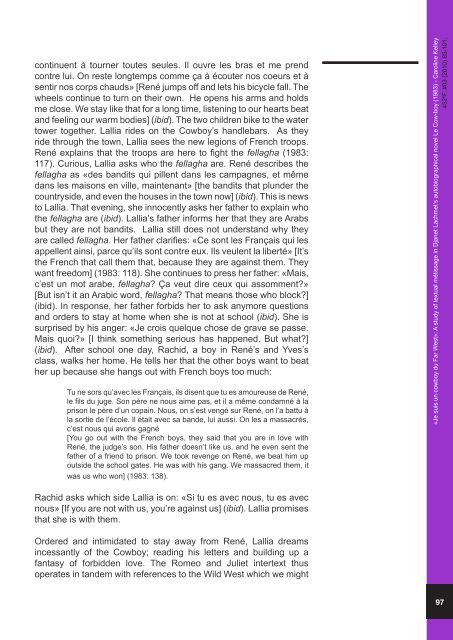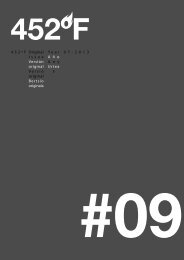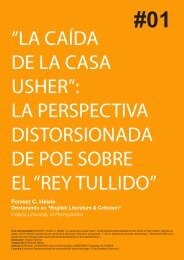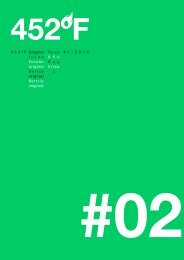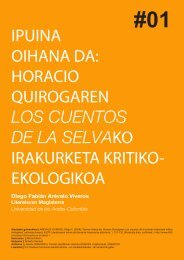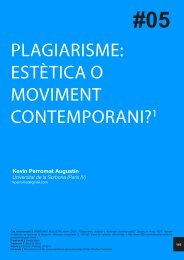03 - 452ºF
03 - 452ºF
03 - 452ºF
You also want an ePaper? Increase the reach of your titles
YUMPU automatically turns print PDFs into web optimized ePapers that Google loves.
continuent à tourner toutes seules. Il ouvre les bras et me prend<br />
contre lui. On reste longtemps comme ça à écouter nos coeurs et à<br />
sentir nos corps chauds» [René jumps off and lets his bicycle fall. The<br />
wheels continue to turn on their own. He opens his arms and holds<br />
me close. We stay like that for a long time, listening to our hearts beat<br />
and feeling our warm bodies] (ibid). The two children bike to the water<br />
tower together. Lallia rides on the Cowboy’s handlebars. As they<br />
ride through the town, Lallia sees the new legions of French troops.<br />
René explains that the troops are here to fight the fellagha (1983:<br />
117). Curious, Lallia asks who the fellagha are. René describes the<br />
fellagha as «des bandits qui pillent dans les campagnes, et même<br />
dans les maisons en ville, maintenant» [the bandits that plunder the<br />
countryside, and even the houses in the town now] (ibid). This is news<br />
to Lallia. That evening, she innocently asks her father to explain who<br />
the fellagha are (ibid). Lallia’s father informs her that they are Arabs<br />
but they are not bandits. Lallia still does not understand why they<br />
are called fellagha. Her father clarifies: «Ce sont les Français qui les<br />
appellent ainsi, parce qu’ils sont contre eux. Ils veulent la liberté» [It’s<br />
the French that call them that, because they are against them. They<br />
want freedom] (1983: 118). She continues to press her father: «Mais,<br />
c’est un mot arabe, fellagha? Ça veut dire ceux qui assomment?»<br />
[But isn’t it an Arabic word, fellagha? That means those who block?]<br />
(ibid). In response, her father forbids her to ask anymore questions<br />
and orders to stay at home when she is not at school (ibid). She is<br />
surprised by his anger: «Je crois quelque chose de grave se passe.<br />
Mais quoi?» [I think something serious has happened. But what?]<br />
(ibid). After school one day, Rachid, a boy in René’s and Yves’s<br />
class, walks her home. He tells her that the other boys want to beat<br />
her up because she hangs out with French boys too much:<br />
Tu ne sors qu’avec les Français, ils disent que tu es amoureuse de René,<br />
le fils du juge. Son père ne nous aime pas, et il a même condamné à la<br />
prison le père d’un copain. Nous, on s’est vengé sur René, on l’a battu à<br />
la sortie de l’école. Il était avec sa bande, lui aussi. On les a massacrés,<br />
c’est nous qui avons gagné<br />
[You go out with the French boys, they said that you are in love with<br />
René, the judge’s son. His father doesn’t like us, and he even sent the<br />
father of a friend to prison. We took revenge on René, we beat him up<br />
outside the school gates. He was with his gang. We massacred them, it<br />
was us who won] (1983: 138).<br />
Rachid asks which side Lallia is on: «Si tu es avec nous, tu es avec<br />
nous» [If you are not with us, you’re against us] (ibid). Lallia promises<br />
that she is with them.<br />
Ordered and intimidated to stay away from René, Lallia dreams<br />
incessantly of the Cowboy; reading his letters and building up a<br />
fantasy of forbidden love. The Romeo and Juliet intertext thus<br />
operates in tandem with references to the Wild West which we might<br />
«Je suis un cowboy du Far West»: A study of textual métissage in Djanet Lachmet’s autobiographical novel Le Cow-boy (1983) - Caroline Kelley<br />
<strong>452ºF</strong>. #<strong>03</strong> (2010) 85-101.<br />
97


